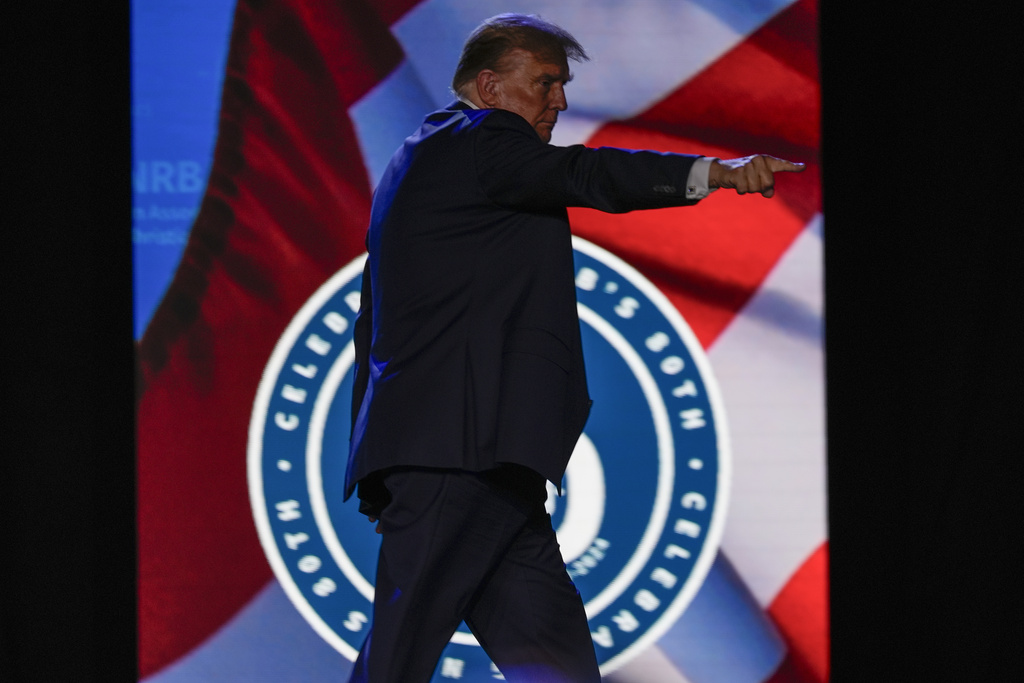Former President Donald Trump urged a Florida judge to dismiss the criminal case charging him with illegally retaining classified documents, claiming in part that presidential immunity protects him from prosecution even as that sweeping argument has so far in failed in federal courts in a separate case.
In one of a slew of motions attacking the case brought by special counsel Jack Smith, Trump’s lawyers late Thursday echoed arguments that were roundly rejected by a federal appeals court this month in his 2020 election interference case in Washington. Trump has asked the U.S. Supreme Court to intervene in that case as the Republican presidential primary front-runner seeks to delay the trial until after the November election.
Trump’s lawyers wrote that the classified documents charges turn on his alleged decision to designate the papers as “personal” records under the Presidential Records Act, and argued that he cannot be prosecuted since that was an “official act” made while he was still in the White House.
Trump has denied wrongdoing in all four of the criminal cases he is facing, and has cast himself as the victim of a politically motivated justice system as he seeks to reclaim to the White House in November.
Washington’s federal appeals court in its decision this month was unsparing in its repudiation of Trump’s novel claim that former presidents enjoy absolute immunity for actions that fall within their official job duties. But Trump’s lawyers argued that the appeals court decision was wrong, telling U.S. District Judge Aileen Cannon not to follow the court’s “poorly reasoned decision” in the classified documents case.
In other court filings late Thursday, Trump’s lawyers argued that Attorney General Merrick Garland’s appointment of special counsel Smith to investigate the former president was “unlawful” and grounds for dismissing the documents case. They also are attacking the law Trump is accused of violating as “unconstitutionally vague” as applied in his case.
The case accuses Trump of illegally hoarding classified documents at his Mar-a-Lago estate and obstructing government efforts to retrieve them. A June 2023 indictment charging him with dozens of felony counts alleges investigators found boxes of sensitive documents recklessly stored at Mar-a-Lago in spaces including a ballroom, a bathroom and shower, his bedroom and a storage room.
Prosecutors have said the documents he stowed, refused to return and in some cases showed to visitors risked jeopardizing not only relations with foreign nations but also the safety of troops and confidential sources. They’ve also accused Trump of asking a staffer to delete camera footage at his Florida estate in an effort to obstruct the federal investigation into his records.
The case is currently scheduled to go to trial in May, but Judge Cannon has pushed back multiple other deadlines and signaled an openness to revisiting the trial date during a pivotal pretrial conference set for March.
Smith’s other case against Trump, accusing him of scheming to overturn his 2020 election loss, was supposed to go to trial in March, but that date was canceled while the former president pushed his claims of presidential immunity. Trump’s lawyers have asked the Supreme Court to keep the case on hold while he continues to fight his presidential immunity claim.
The Supreme Court has previously held that presidents are immune from civil liability for official acts, and Trump’s lawyers have for months argued that that protection should be extended to criminal prosecution as well.
The justices’ decision on what to do and how quickly they act could determine whether the 2020 election case goes to trial before the November election. It carries enormous political ramifications, as Trump — if he wins — could potentially use his authority as head of the executive branch to try to order a new attorney general to dismiss the federal cases. Or he potentially could seek a pardon for himself — something that’s a legally untested proposition.
(AP)












One Response
He might be better off making an equal protection argument, arguing that selective prosecution based on political ideology violates the first amendment, and that this is a matter of administrative law so once an administrative court decides Trump should turn over documents, they need to sue in a District Court – rather than send in the FBI to raid his house.
Lifetime complete immunity will probably lose (e.g. if the president murders someone in cold blood, would his office render him immune???). Remember the office of president is NOT based on the British king (that goes to the Congress or the states or the people), but on the king’s servants (what we now call a prime minister) – and the king’s servants never had immunity.